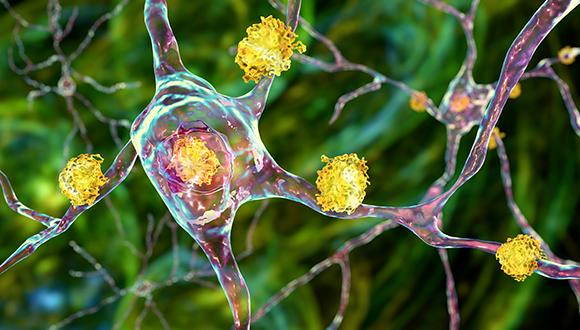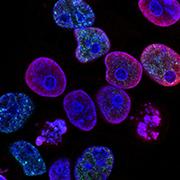PERK Modulation for Huntington’s Disease Therapy
|
Novel pharmacological approach for treating glycogen storage disorders |
|
Novel specific disease-modifying PERK activator for Huntington’s disease
The Need
- There is no efficient therapy at present for neurodegenerative diseases, including Alzheimer's, Parkinson's and Huntington’s diseases. No disease-modifying approaches exist.
- Gene therapy-based clinical trials have failed so far, highlighting the need for other approaches.
Background
- Endoplasmic reticulum (ER) stress-induced cytotoxicity is a central underlying mechanism shared by all neurodegenerative diseases.
- ER stress induces the unfolded protein response (UPR), which activates several pathways, one initiated at the ER membrane by the PERK kinase.
- This response is initially cell protective but can be cytotoxic in the long-term. Initial approaches based on inhibition of the PERK pathway failed.
- We have successfully tested PERK activation as a therapeutic approach for Huntington’s disease (HD). We determined that there is a strong induction of ER stress in neurons of the brain striatum, the cells that first degenerate in HD patients, but the UPR in these cells is insufficient.
- The proof of concept in HD suggests that a PERK activator could help boost the cellular protective mechanisms in neurodegenerative diseases.
The Invention
- A novel small molecule activator of the PERK sensor of the UPR called MK-28 was developed.
- MK-28 showed excellent efficacy - compensates for ER stress induced cytotoxicity and rescues HD cellular and mouse models from cell death.
- Motor function is significantly improved and life expectancy is extended in HD mouse models.
- MK-28 is specific - selectivity for PERK was shown in a kinase panel with purified components and lack of activity in PERK knockout cells.
- MK-28 is a small BBB-penetrating molecule with a favorable pharmacokinetics profile.
- MK-28 is non-toxic and safe - preliminary toxicity tested in vitro and in vivo.
Current Development Stage and Future Plans
- In the current SPARK-funded project we are applying a medicinal chemistry approach to improve the properties of MK-28.
- Iterative cycles of design and synthesis, focusing on Structure Activity relationship and solubility optimization.
- In the 5 months since starting this project we have performed preliminary ADME profiling of designed and synthesized compounds of the first iterative cycle.
- We have tested efficacy for cell rescue by the compounds from ER stress-induced apoptosis, identifying a lead compound of the first iterative cycle.
- Ongoing: Novel assays to measure compound reduction of ER stress.
- Our future plans include lead efficacy and selectivity in vitro.
- This will be followed by lead efficacy in HD model mice, PK and BBB penetration, shortterm toxicity in mice, stability.
- The lead compound will be assessed for other neurodegenerative diseases
Back to Rare/Orphane Disease Research lobby >>
Related researches >>
Related videos >>
Gallery >>





